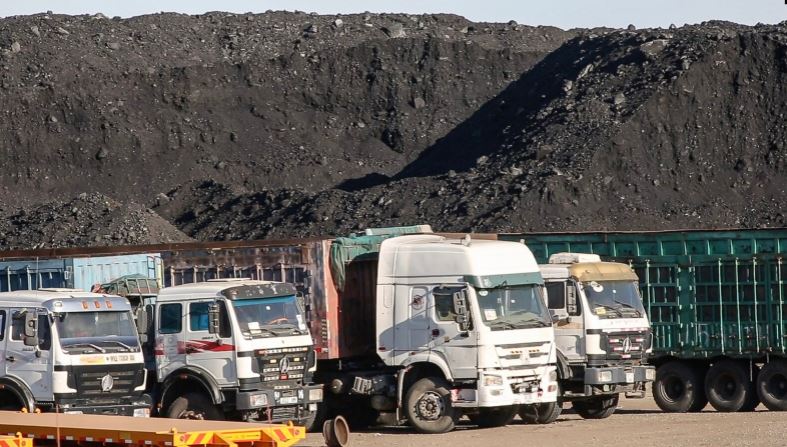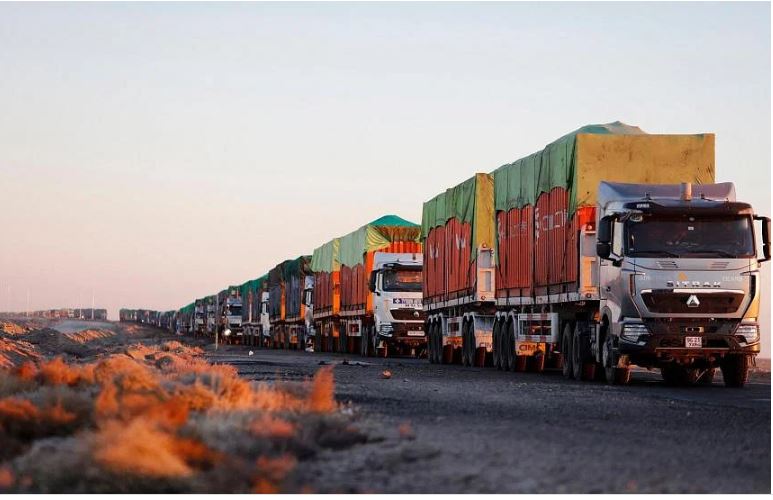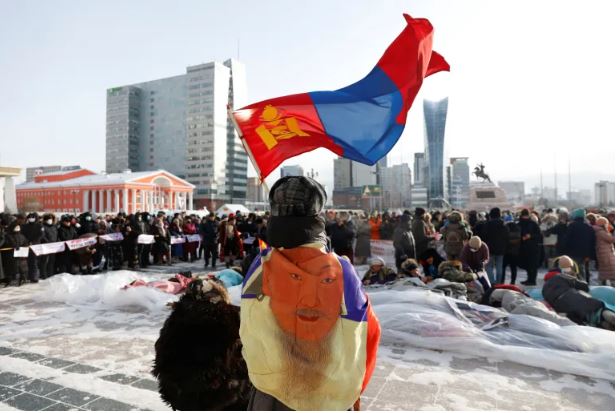After protests, Mongolia makes a commitment to improve its coal trading with China.
After a scandal involving underground coal sales, the government of Mongolia will hold stock exchange coal auctions.
To protest corruption in the nation’s coal trade, demonstrators overran the capital of Mongolia last month. After years of unscrupulous commercial dealings, the government now claims to have a remedy.
Beginning next month, Erdenes-Tavantolgoi JSC, the biggest state-owned coal miner in the nation, will stop negotiating direct sales agreements with customers in neighboring China, which last year bought 84 percent of all of Mongolia’s exports.

Instead, the coal owned by the business will be sold at auction on the Mongolian Stock Exchange. The decision to sell coal contracts through the market was made in reaction to major anti-corruption demonstrations that took place in Ulaanbaatar in December and were brought on by claims of rampant fraud in the coal industry.
The company Erdenes-Tavantolgoi JSC was the subject of the claims; its chief executive Gankhuyag Battulga, along with a number of his collaborators and family members, have been detained and are currently awaiting trial on charges of embezzling billions of dollars in coal revenue.
Authorities claim that the auctions will increase openness and, as a result, bring in more money for the state.
The government had intended to begin the bidding process later this year, but it has since accelerated it in response to public anger about corruption.
According to Batnairamdal, vice minister of mining and heavy industry for Mongolia, “instead of waiting for half a year, we will have it traded online starting in February, and the Mongolian Stock Exchange will handle it.” “This will enable us to gain experience in coal sales on an online platform.” With 3.3 million inhabitants dispersed over an area slightly smaller than Alaska, Mongolia, which is sandwiched between Russia and China, is one of the least populous nations in the world.

Similar to Indonesia, the nation had a gross domestic product (GDP) per capita of roughly $4,500 in 2021. The Extractive Industries Transparency Initiative estimates that the mining industry contributes about 25% of the nation’s GDP. Coal makes up around half of its export revenue.
The agreements are valid for coal shipped via the Gashuunsukhait border crossing, which is situated about 240 kilometers (150 miles) south of the Tavan Tolgoi coal resource in the Gobi Desert.
Affected businesses include Energy Resources LLC, whose parent company Mongolian Mining Corp is traded on the Hong Kong Stock Exchange, as well as Erdenes-Tavantolgoi. Tavan Tolgoi, one of the largest coking and thermal coal resources in the world with 6.4 billion tonnes of reserves, is the site of coal excavation for both businesses.
In China, where it is used to make steel, the coal from Tavan Tolgoi is highly sought.
China produces 57 percent or more of the world’s steel, making it the largest manufacturer in the world. However, it is unable to domestically manufacture enough coking coal to supply its steel mills.
The General Administration of Customs of China reports that in 2022, China imported 170.71 million tonnes of coal. About 18% of the total, or 31.2 million tonnes, came from Mongolia.
Since China has reduced its reliance on Australian coal as a result of a significant deterioration in ties between the two nations, Mongolia’s coking coal has grown to be of particular value.
12,800 tonnes of coking coal were auctioned off to a coal transporter based in Singapore as part of a trial run deal the stock market organized earlier this month to test the new method. From 1,150 to 1,290 Chinese yuan ($170-$190) per tonne, the final call price had risen 12.2 percent over the initial asking price.
The exchange’s chief financial officer, Javkhlan Ivanov, told Al Jazeera that “the inaugural trade shows that coal contracts would assist to improve the transparency of the coal trade and raise sales revenue.” The trading commission for coal E-auctions will be 0.1 percent and they won’t involve any brokers.
Behind-the-scenes transactions

The installation of the new system follows the arrest last month of several coal mining executives and their accused accomplices for allegedly robbing Erdenes-Tavantolgoi JSC.
A large portion of the theft was allegedly carried out by engaging in illegal coal transactions with Chinese purchasers at the border.
The government claims that distributing coal through the stock exchange will stop theft and underhanded transactions. On a Transparency International corruption perceptions index created two years ago, Mongolia was placed 110th out of 180 nations.
Previously, Batnairamdal claimed, “state-owned businesses executed purchase and sales agreements with buyers they discovered and they did it behind closed doors.” The new system will allow every buyer to register an account and take part in the commodities purchase through authorized brokers on an even playing field.
Plans to include other minerals in the coal auctions are also in the works. Copper, iron ore, gold, fluorspar, molybdenum, and other minerals are examples of potential trading commodities. Spot, futures, options, and forward contracts will all be available, according to Javkhlan.
Chinese and Russian importers, as well as international and domestic derivative traders, would be the key buyers.
In order to create its own exchange, Mongolia is looking at mature exchanges like the London Metals Exchange as well as commodities exchanges in developed and growing economies like Turkey and Poland.
Commodity exchanges can be helpful when they bring buyers and sellers together in low-liquidity or opaque markets, according to Jake Horslen, senior LNG analyst for Energy Aspects, a market analysis company with offices in London.
As the exchange acts as the counterparty for buyers and sellers in each contract rather than another entity, Horslen told Al Jazeera that they can also lower counterparty risk.
17 people who are allegedly connected to the theft from Erdenes-Tavantolgoi JSC have been detained thus far as part of the corruption investigation that launched several of the adjustments.
One among people being questioned about their role is former president Khaltmaa Battulga. The chief executive of Erdenes-Tavantolgoi JSC was abruptly removed in October, and leadership of the firm was given to a special representative from the ministry of finance.
This was a sign that something was wrong with the company. Thousands of people flocked to the streets in bitter cold to demand accountability after the corruption charges in December. The government has committed to reforming Erdenes-Tavantolgoi JSC, implementing a transparent hiring procedure, and eventually turning the corporation public.
“The demonstrators are looking for a fix. They want the required improvements because they don’t want incidents like [the] coal theft to recur. “The mining industry needs reform,” stated Batnairamdal.
The commodities market, according to Inside Mongolia’s editor-in-chief Zolbayar Enkhbaatar, could aid the government in regaining some of the trust damaged by the Erdenes-Tavantolgoi JSC scandal.
Zolbayar told Al Jazeera that “Mongolians appear to consider the stock exchange as a symbol of transparency.” “The lack of transparency on the part of the relevant corporations made the coal theft conceivable; no one could see how or to whom they were selling coal.”
Others are more circumspect. According to Amar Adiya, regional director for the strategic advisory company BowerGroupAsia in Washington, DC, creating a successful commodities market in Mongolia will necessitate the daily trading of a large number of commodities.
Amar told Al Jazeera, “It is not an easy assignment.
Amar stated that while a commodities exchange would in the long run be advantageous for both buyers and sellers of coal, it won’t do much to quell public fury over persistent problems with corruption and quality of life.
According to Amar, “the exchange may be seen as a first step in tackling wider challenges connected to inequality, cost of living, the environment, and public health.” However, in order to win over the populace before the elections in 2024, the administration must take a comprehensive approach to address these issues.




